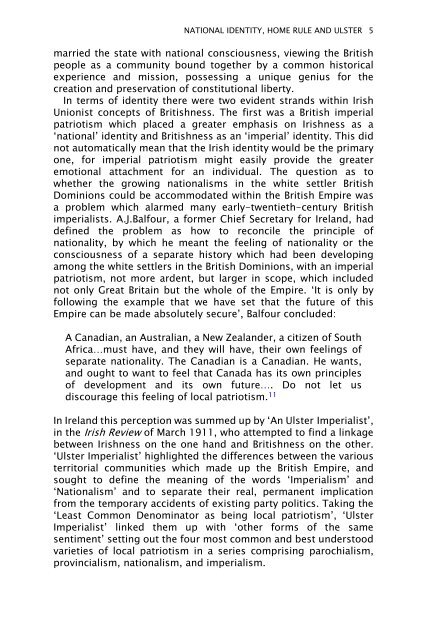Dividing Ireland: World War I and Partition
Dividing Ireland: World War I and Partition
Dividing Ireland: World War I and Partition
You also want an ePaper? Increase the reach of your titles
YUMPU automatically turns print PDFs into web optimized ePapers that Google loves.
NATIONAL IDENTITY, HOME RULE AND ULSTER 5<br />
married the state with national consciousness, viewing the British<br />
people as a community bound together by a common historical<br />
experience <strong>and</strong> mission, possessing a unique genius for the<br />
creation <strong>and</strong> preservation of constitutional liberty.<br />
In terms of identity there were two evident str<strong>and</strong>s within Irish<br />
Unionist concepts of Britishness. The first was a British imperial<br />
patriotism which placed a greater emphasis on Irishness as a<br />
‘national’ identity <strong>and</strong> Britishness as an ‘imperial’ identity. This did<br />
not automatically mean that the Irish identity would be the primary<br />
one, for imperial patriotism might easily provide the greater<br />
emotional attachment for an individual. The question as to<br />
whether the growing nationalisms in the white settler British<br />
Dominions could be accommodated within the British Empire was<br />
a problem which alarmed many early-twentieth-century British<br />
imperialists. A.J.Balfour, a former Chief Secretary for <strong>Irel<strong>and</strong></strong>, had<br />
defined the problem as how to reconcile the principle of<br />
nationality, by which he meant the feeling of nationality or the<br />
consciousness of a separate history which had been developing<br />
among the white settlers in the British Dominions, with an imperial<br />
patriotism, not more ardent, but larger in scope, which included<br />
not only Great Britain but the whole of the Empire. ‘It is only by<br />
following the example that we have set that the future of this<br />
Empire can be made absolutely secure’, Balfour concluded:<br />
A Canadian, an Australian, a New Zeal<strong>and</strong>er, a citizen of South<br />
Africa…must have, <strong>and</strong> they will have, their own feelings of<br />
separate nationality. The Canadian is a Canadian. He wants,<br />
<strong>and</strong> ought to want to feel that Canada has its own principles<br />
of development <strong>and</strong> its own future…. Do not let us<br />
discourage this feeling of local patriotism. 11<br />
In <strong>Irel<strong>and</strong></strong> this perception was summed up by ‘An Ulster Imperialist’,<br />
in the Irish Review of March 1911, who attempted to find a linkage<br />
between Irishness on the one h<strong>and</strong> <strong>and</strong> Britishness on the other.<br />
‘Ulster Imperialist’ highlighted the differences between the various<br />
territorial communities which made up the British Empire, <strong>and</strong><br />
sought to define the meaning of the words ‘Imperialism’ <strong>and</strong><br />
‘Nationalism’ <strong>and</strong> to separate their real, permanent implication<br />
from the temporary accidents of existing party politics. Taking the<br />
‘Least Common Denominator as being local patriotism’, ‘Ulster<br />
Imperialist’ linked them up with ‘other forms of the same<br />
sentiment’ setting out the four most common <strong>and</strong> best understood<br />
varieties of local patriotism in a series comprising parochialism,<br />
provincialism, nationalism, <strong>and</strong> imperialism.








